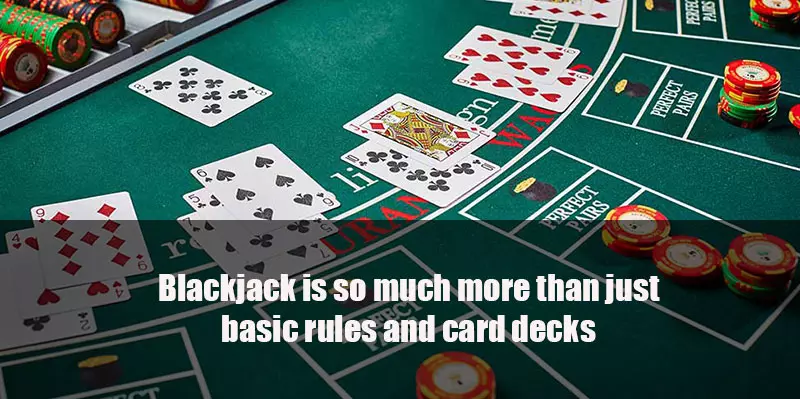Blackjack is one of the most played casino games of all time and it is also known as twenty-one because this particular number is crucial to the game’s objective. It is offered by almost every casino worldwide, which makes it extremely convenient for players, as they can enjoy it wherever they go. So far, the game’s origin remains unknown, and the first written evidence of the game dates back to the 17th century.
Blackjack grew in popularity largely because, unlike many other casino games, it can be won with the right strategy and skills. It is true that it requires more preparation and knowledge than most other games, but players can be sure that their effort and time will be worthwhile. The more they practise, the better their chances of gaining an advantage over the opponent, which, in this case, is the casino. This is why there are numerous strategies they can learn and try, which makes the game extremely interesting and challenging.
Overview
Even though many people are familiar with the basic rules of the game, only a few know what it takes to win. Lacking the right strategy and knowledge, many players fail to understand how Blackjack actually works. Despite being one of the hardest casino games of all time, it is also one of the most popular. The reason is quite simple: as already mentioned, Blackjack is so much more than just basic rules and card decks. Its popularity was also boosted in the past when the mainstream media drew attention to it by publishing various interesting stories and news items that attracted many players.
Blackjack Is the Only Mathematically Beatable Casino Game
Blackjack is unlike any of the other games available on the casino floor because, contrary to popular belief, it requires a good deal of decision-making. Players’ decisions have a direct impact on their long-term odds of winning. Good decisions increase players’ long-term chances of turning a profit, whereas bad decision-making inevitably leads to greater losses in the long run.
Blackjack stands out from other games because it is mathematically beatable. In fact, it is the only gambling game, along with full-pay video poker, where players can gain an edge over the house through strategic play. But why can a gambler prevail in blackjack while having no chance of beating games like roulette or craps in the long run? It all boils down to two mathematical concepts – dependent trials and independent trials.
The vast majority of casino games, including craps, slots, roulette, keno, and stud poker, are games of independent trials. Even if a craps player throws a 7 on five straight rolls, their chances of winning or losing on the sixth roll remain the same.
A craps shooter cannot obtain any viable information to improve their winning odds by examining the results of previous trials. All possible outcomes in chance games of independent trials share the same odds of occurring. An outcome can occur a hundred times in a row but it still stands an equal chance of occurring on the 101st trial.
With independent trials, the probability of all possible outcomes happening is the product of the individual probabilities of the outcomes. An independent trial has no impact whatsoever on the probabilities of occurrence of the rest of the trials. Moreover, as these results are entirely random, no strategy can help you to predict what outcome will occur next.
Dependent Trials in Blackjack
This is not the case with blackjack, though, which is a game of dependent trials. Here, the collective probability of all outcomes is determined by their conditional probabilities. In blackjack, the conditional probability of an outcome is affected by the outcomes that occurred before it.
People frequently say the cards have no memory but this aphorism does not apply fully to the game of blackjack. Cards that have already been dealt impact the remaining deck’s composition. In turn, this influences the players’ winning chances in the future. Let’s consider the following example.

You take a deck of 52 cards and shuffle it up with your friends, John and George. You receive a pair of aces on the first round of play while John and George both get blackjacks (an ace next to a 10 or a face card).
The cards that have just left the deck give you very valuable information about what is likely to happen next. In one such scenario, you can easily deduce that no blackjacks can possibly occur during the second round of play unless you return the discards to the deck and reshuffle. All four aces have left the deck, so blackjacks are impossible.
A Parallel with Another Casino Card Game
This partial predictability is exactly what makes blackjack a mathematically beatable game as long as one uses an adequate strategy. It is worth mentioning that the casino card game baccarat is also based on dependent trials, although it is significantly less exploitable than blackjack.
The main difference here is that the edge baccarat players can gain through card tracking is very minuscule. This stems from the fact the player and the banker hands are played under a fixed rule set each and every time.
Furthermore, the set of drawing rules for the player hand is similar to that for drawing to the banker hand. There is absolutely no decision-making on behalf of the player or the dealer. The bottom line is that in baccarat, there are no cards that strongly tip the odds either in favour of the house or the players.
The Origin of Blackjack Strategies
The stage for beatable blackjack was set in the 1950s with the discovery of basic strategy. But perhaps more interesting is the fact that this strategy was invented by four men who had nothing to do with blackjack, or gambling for that matter. Herbert Maisel, Wilbert Cantey, Roger Baldwin, and James McDermott were all US Army engineers with a background in mathematics.
It occurred to them that blackjack is based on dependent trials and players could gain an edge by keeping track of the dealt cards. The four men subsequently devised a mathematically optimal strategy for each possible player hand against each possible dealer card by using desk calculators.
It told players what the optimal playing decisions were in every possible situation they might encounter at the blackjack tables. The strategy they birthed first appeared in 1956 in the Journal of the American Statistical Association.
Casinos paid no mind to this publication at the time but it captured the attention of another numbers man, Professor Edward O. Thorp, who tested the strategy using early computers at MIT. Thorp ran a number of simulations and discovered that the playing decisions suggested by the four engineers were accurate to a tee.
Advanced Play
Thorp proceeded with more simulations to perfect the strategy and subsequently came up with a clever way to gain an advantage over the house in blackjack. Thorp also invented the first system for card counting and published it in his book Beat the Dealer. Note that all this occurred at a time when blackjack was still played with a single deck of cards.
Thorp’s book became a big hit, which eventually led to casinos tweaking the rules of the game in an attempt to offset the advantage basic strategy and card counting gave to players. Playing conditions became less favourable and more decks were introduced into play. The irony lies in the fact this only resulted in the invention of newer, simpler, and more effective strategies and card counting systems.
Also ironic is that Beat the Dealer led to greater profits for casinos from their blackjack tables. Many people read the book and arrived on the gaming floor with the intention to beat the house at its own game. Few actually succeeded.
Most laymen lacked the patience, time, and inclination to learn basic strategy, let alone to master advanced techniques like card counting. Casinos around the world had a field day as unskilled recreational players crowded at their blackjack tables.
Further Refinements of Blackjack Strategy Play
Then another mathematician arrived on the scene to drive blackjack strategy and advantage play to new heights. Harvey Dubner was also something of a computer expert, so it did not take him long to come up with a newer card counting system that was much simpler than Thorp’s.

Mr Dubner gave the blackjack community a very precious gift in the form of the High Low Count system. It was originally presented at a Las Vegas conference during a panel called “Using Computers in Games of Chance and Skill”.
The High Low Count remains the most popular and widely used counting system by advantage players to this day. The system was later refined by a computer programmer named Julian Braun. The improved version was then published in the 1966 edition of Thorp’s now-legendary Beat the Dealer book.
The Work of Julian Braun and John Scarne
Among the people who saw a deeper meaning in blackjack were the mathematicians Julian Braun and John Scarne who dedicated a considerable amount of time to studying how the game actually works. They took into account even the smallest details of the game and observed how every move altered the course of play.
As a result, they created many strategies and theories which allowed them to predict, to some extent, how future rounds would unfold. Even though Mr Braun and Mr Scarne were not gamblers, they managed to make a number of findings that greatly contributed to what we know today about blackjack.
Their theories were proof that the game follows a particular pattern and, therefore, it can be guided and influenced using an appropriate strategy. This is one of the reasons why the number of decks in the game was increased several times, because many casinos started losing money as a result of these findings; this was their attempt to prevent skilled players from beating the game.
The secret behind every useful strategy that has ever been developed lies in the odds and probabilities of the cards. In order to be able to apply any of these strategies correctly, it is essential to understand their principles and know them inside out. The work of Mr Braun, in particular, was so important that it earned him a spot in the Blackjack Hall of Fame in Las Vegas. He was inducted in 2005 for his contribution to blackjack statistical analysis.
Counting Cards in Blackjack
Basic blackjack strategy tells you how to optimally play your hands against different dealer upcards. While this reduces the house edge to under 0.5%, it cannot guarantee long-term success. The strategy is based only on the knowledge of three cards and does not account for the changing deck composition.
The silver lining is that blackjack players can tilt the odds in their favour and turn a long-term profit by mastering card counting. Unlike baccarat, where no cards significantly favour the player or the dealer, in blackjack, the excess of high cards remaining to be dealt works to the advantage of players. Conversely, when low cards outnumber high cards, the advantage switches in favour of the dealer.
A card counter can turn a long-term profit by betting more during advantageous high counts when their winning chances are greater. Conversely, the size of wagers decreases as the deck is depleted of high cards.
Some players prefer not to place bets at all when they are at a disadvantage and wait it out until the composition of the deck(s) changes, a practice known as wonging out. For more information on card counting and basic strategy, you can check Casino Guardian’s articles on these topics.
What It Takes To Win
In blackjack, every decision matters greatly because every move players make can change the game’s course completely and lead to a different outcome. The possible card combinations are virtually endless, and, if players want to win, they need to think ahead to their opponent’s next move. To become winners, they must be well prepared and take the following into account before entering the game: their bankroll, money-management skills, and acquired knowledge. Of course, Blackjack is a casino game and, as such, there is no universal formula that will inevitably guarantee success.
Blackjack Rules
Blackjack Variations
Blackjack House Edge
Blackjack Odds and Probabilities
Blackjack Soft & Hard Hands
Players should also bear in mind that, in order to accomplish their goal, they need to have a decent bankroll. A lot of people view Blackjack just like the rest of the casino games – a chance to win big if they get lucky – and thus believe there is no need to have a decent bankroll beforehand. Unfortunately, this game doesn’t work like that, and many people learn this the hard way by losing a substantial amount of money.
However, it is worth noting that having a decent bankroll does not determine whether players will win or lose; it simply sets the amount they stand to win. Moreover, discipline and money-management skills always play a crucial role in players’ performance and shouldn’t be underestimated in any case.

Important Things to Consider Before Playing Blackjack
Relying completely on luck while playing blackjack is not only a waste of time but also of money. Players are strongly advised to set win goals and loss limits before they join the game. By doing so, they avoid the risk of surpassing these limits, which can help them develop better discipline and resist the temptation to continue. It is indisputable that blackjack requires a solid bankroll. However, the starting amount is not fixed, though it directly influences every decision made during the game.
Conclusion
Players should remember that several essentials must be considered before playing if they wish to win in the long term. In order to do so, they need to know the rules by heart, have a good bankroll, and learn basic strategy.
It is highly advisable to acquire all the necessary knowledge and to know a strategy backwards and forwards, as this is the only way to achieve long-term success. Blackjack is the perfect casino game for adventurous players who like to challenge themselves by putting their skills and knowledge to the test, while also having the chance to turn a profit and have fun.



